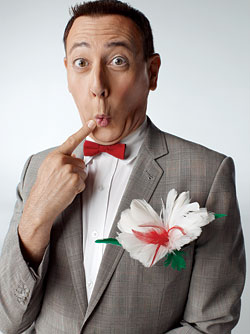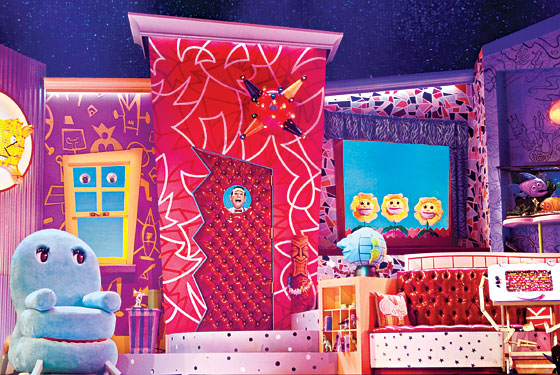
Performers who make a name for themselves in the guise of an alter ego usually have a short shelf life. They tend to become camp curiosities within minutes of achieving cultural saturation. But Paul Reubens avoided the fate of Carrot Top, Andrew “Dice” Clay, Larry the Cable Guy, and their ilk, who, if they remain familiar, do so in the manner of a mortifying ex. Reubens survived on his own terms because his Pee-wee Herman was a much savvier invention, utterly specific visually (snug glen-plaid suit, red bow tie, white loafers) but otherwise built on a series of childlike ambiguities (hostile or silly? gay or straight? wise or innocent?) that he steadfastly refused to resolve or even acknowledge. In his first decade of fame—from The Pee-wee Herman Show, which played Hollywood’s Roxy Theatre in 1981, to the 1985 hit movie Pee-wee’s Big Adventure (directed by the neophyte Tim Burton) to Pee-wee’s Playhouse, the Saturday morning kids’ show that ran on CBS from 1986 to 1991—Reubens rarely appeared as himself in public. And then, in the wake of his 1991 arrest for indecent exposure (he was supposedly masturbating in a porn theater), he stopped appearing in public altogether, except rather brilliantly to ask the audience at that year’s MTV Video Music Awards if they’d “heard any good jokes lately.”
The taint of the overblown scandal—exacerbated in 2001 when he was falsely charged with possessing child pornography—may have stuck like glue to Reubens, but it bounced right off Pee-wee. So while the actor went on to take small, dark roles (he played a suicide in Todd Solondz’s recent Life During Wartime), his alter ego lived on, Peter Pan–like, and has reemerged unscathed. A new Pee-wee movie, to be directed by Judd Apatow, is in development, and in what feels like a kind of homecoming (though he’s never appeared in a Broadway house) Reubens is bringing The Pee-wee Herman Show to the Stephen Sondheim Theatre, in a production that starts previews on October 26 and runs through January 2. It is perhaps a sign of the breadth of his rehabilitation that on the day he spoke to New York, Reubens had just returned from (of all places) a series of promotional appearances among the hog-heads at the annual Sturgis Motorcycle Rally in South Dakota.

Yours is the first show in the former Henry Miller’s Theater since it was renamed for Stephen Sondheim. Some people might find that ironic—do you?
I don’t know what you mean. I love Sondheim’s work.
Well, he’s the writer of the darkest, most serious musicals around …
I guess the fact you had to explain it to me is the answer. I hate to come off as such a hick here—it’s not like I’m totally unfamiliar with Broadway. I almost took over for Alan Cumming for Cabaret, and almost went into How to Succeed … after Matthew Broderick. I’ve been offered stuff, but always to replace somebody, and it’s always too long of a commitment. This is a long commitment, too, but it’s a commitment to my own story.
How similar is the Broadway show to the version you did in the early eighties, or to the television series?
It has the same plot, in which Pee-wee has this dream to fly. But I spent five months rewriting it because it didn’t have all the characters from the CBS series, and I thought people would wonder where they were.
So we’ll see Chairry and Miss Yvonne and Cowboy Curtis and all the rest?
Right.
It’s amazing what you were able to get away with on TV. Did CBS ever censor you?
There was no interference. I’ve been in many situations where people promise to leave you alone, but you write a script and the next day they have fifteen notes for you: “Change the dog to a cat.” Instead, in five seasons of my show, I probably had a total of five notes. They never even saw the show until it was finished, two hours before it aired.
Could Pee-wee’s Playhouse get made today?
It would be difficult in one sense: There isn’t even Saturday morning anymore! Now there are so many more outlets, and they’re 24/7. But in terms of content, I would argue it was tamer than you think. Everything is—even the Sturgis Motorcycle Rally. Pee-wee’s Playhouse was sort of what Johnny Carson used to be: always titillating, but not more than that. A dirty joke that wasn’t explained. I mean, a line like “You know what they say, Pee-wee: ‘Big shoes, big feet!’” isn’t very blue. And no one wanted it to be. They were kids!
But the tone suggested the existence of another world children might someday gain access to. Did you actively try to shape kids, or was that a by-product of entertaining them?
I took it seriously, 150 billion percent. It may sound corny and stupid, but I had an opportunity to come in under the radar and do something important. Sesame Street was already on, but it was very corporate in a certain way, and I just felt I had this opportunity to be entertaining, less “we’re going to learn the letter Q today.” They had that covered. I was going to be lighter and more specific, more like: All your friends got invited to a party, and you didn’t. I was so lucky—I was presented with such an opportunity. And if I can pat myself a teeny-tiny amount on the back, I delivered. I was in a position to shape a certain percentage of kids who watched, teach them things that I think are important in life, like the golden rule, and wrap it up in colorful eye candy and make it seem like fun. It would be hard to do that at all today—and I got to do it for five years. And not only that, I can feel the effects still. I’m meeting people who say they are an artist because of my show. It’s staggering. People say, “Do you have any idea what a difference you made?” No, but I’m starting to.
Do you think that’s your signal achievement?
I’m not trying to be coy or facetious, but I don’t know the answer to that, and I don’t think I should. Because (a) I’m afraid it’ll dry me up and I won’t be able to do what I want to do, and (b) I don’t feel the need. I leave that to others. For me, it would be like Samson cutting his hair.
Speaking of transformations, is it hard, twenty years along, to fit into Pee-wee’s suit?
I still fit into the same size suit—but I don’t know what size it is. I don’t know what size suit I wear, either.
Does Pee-wee appear when you put it on? Is he a character you switch into, or one you release, like from prison?
Well, I don’t give it too much thought. It’s more like … riding a bike.
You’re about to have a birthday.
Yes, I’ll be 39.
Right, 58. And how old is Pee-wee?
I don’t know the answer to that.
The Pee-wee Herman Show
Stephen Sondheim Theatre.
In previews Oct. 26. Opening Nov. 11.